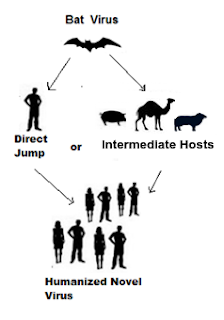
#15,247
The SARS-CoV-2 virus - much like SARS and MERS-CoV before it - appears to have originated from a bat, and jumped (likely via an intermediate host) to humans.
The SARS-CoV-2 virus - much like SARS and MERS-CoV before it - appears to have originated from a bat, and jumped (likely via an intermediate host) to humans.
While the exact route remains unknown, we've seen evidence that other animals besides humans, are susceptible to infection with this novel coronavirus.Ten days ago, in Netherlands: COVID-19 In Farmed Mink, we looked at an outbreak across 2 mink farms, while a little over a month ago, in Susceptibility of Ferrets, Cats, Dogs & Other Domestic Animals to SARS-CoV-2, we looked at the experimental infection of a variety of farmed animals and household pets with the novel coronavirus.
The authors wrote:
We found that SARS-CoV-2 replicates poorly in dogs, pigs, chickens, and ducks, but efficiently in ferrets and cats. We found that the virus transmits in cats via respiratory droplets.In mid-April, in APHIS: Confirmation of COVID-19 in Two Pet Cats in New York, we saw the first confirmed COVID-19 infection in household pets in the United States, although we've previously seen scattered reports from Hong Kong (see here and here).
And just as we've seen with avian flu, COVID-19 has also infected big cats (see WCS: A Tiger at Bronx Zoo Tests Positive for COVID-19).All of this naturally has pet owners worried about the health of their pets, and just this week I was asked about the risks from a relative. I assured her that while susceptible to the virus, household pets were far more likely to be infected by a human (reverse zoonosis), than the other way around.
Of course, with the caveat that we are still learning about this virus - and thing could change.Because of the concern, the CDC has generated (and updated) guidance for pet owners, and anyone likely to come in contact with animals, for this COVID-19 pandemic. Note: This is a `work in progress' and the advice may change over time.
Pets and Other Animals
 |
| Credit CDC |
Only a few pets have tested positive for the virus that causes COVID-19. Currently, the risk of pets spreading it to people is low. Learn moreAnimals and COVID-19
If You Have Pets
If Your Pet Tests Positive
Guidance for Veterinary Clinics
In addition to these webpages, the CDC maintains an extensive COVID-19 FAQ (Frequently Asked Questions) list, including a section on COVID-19 & Animals.
SARS-CoV-2 in animals
While the infection risk to, and from, animals is believed to be low at this time, the AVMA suggests:
Until more is known about this virus, if you are ill with COVID-19 you should restrict contact with pets and other animals, just as you would restrict your contact with other people. When possible, have another member of your household or business care for any animals, including pets while you are sick. If you have a service animal or you must care for your animals, including pets, wear a cloth face covering; don’t pet, share food, kiss, or hug them; and wash your hands before and after any contact with your pet, service animal, or other animals. You should not share dishes, drinking glasses, cups, eating utensils, towels, or bedding with other people or pets in your home.
EmoticonEmoticon